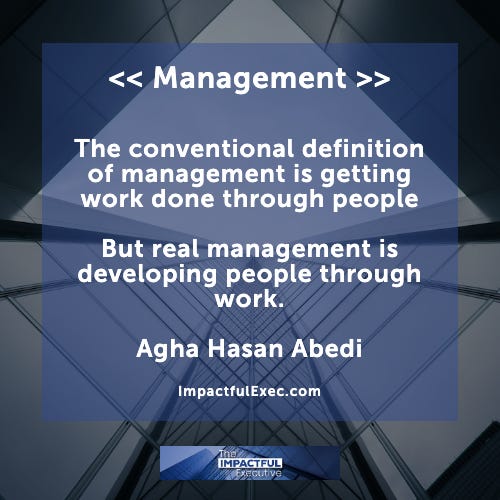Weekly Impact Brief (2023.Dec.03)
Navigating the interconnected world; how to manage workplace psychological safety, negativity and pushback; and effective task management.
Note: We are in private beta. There are rough edges; this Brief will evolve in the coming weeks before we launch more broadly. We value your feedback! To share your input, click here.
Read time: 4 min
Welcome
It’s great to have you here!
This Brief offers leaders quick, fact-driven insights on trending articles released in the last week around leadership, innovation, and more. These are curated from top sources, such as McKinsey, Harvard, and many others, looking at elements of the Impactful Framework.
In case you missed the last Impact Briefs, here are the links for the previous two:
Thought Starter
Last week, we covered the element of “Processes”; this week, we cover “Management”. Efficient management practices, such as effective goal setting, planning, and resource allocation, are necessary for organizational success and also tie in closely with leadership practices and how an organization is led.
Highlights
McKinsey & Company: A New Paradigm For Our Connected World?
Wharton School of the University of Pennsylvania: The Downside Of Psychological Safety In The Workplace
Harvard Business School: Employee Negativity Is Like Wildfire. Manage It Before It Spreads
Forbes: Do It, Delegate It, Ditch It: Your New Approach To Task Management
[Feature] MIT Sloan Management Review: Five Ways Leaders Can Turn Pushback Into Progress
Impact Pulse
Each week, we review 200+ articles from 50+ premier academic and consulting firm sources to highlight a few “essentials” below.
A New Paradigm For Our Connected World?
Big Idea: Globalization can lead to challenges like supply chain disruption and increased rivalry between countries. Leaders should enhance connections by strengthening their geopolitical understanding, developing dynamic strategies, and focusing on diversification.
Quick Quote(s): "Connections are fraying… yet global cooperation remains essential…The old paradigm of globalization largely depended on businesses taking the lead. Now, governments are playing a greater role, and this is likely to be a core consideration for every multinational going forward… Companies that thoughtfully manage their concentrated exposures are likely to be more resilient—not only able to absorb a supply disruption but also able to bounce back better… In April 2022, 81 percent of global supply chain leaders surveyed said they had initiated dual sourcing of raw materials, up 26 percentage points from the previous year."
The Downside Of Psychological Safety In The Workplace
Big Idea: Being too comfortable at work can lead to poorer job performance. A balance must be found between psychological safety and accountability in the workplace.
Quick Quote(s): "Innovation is often associated with a relaxed office culture where employees feel safe to try new things and take risks, but… too much 'psychological safety' in the workplace can harm the performance of typical jobs… The idea behind psychological safety is that we should not fear ridicule or being put down in contexts where we are trying to learn or be creative. It was never meant to suggest that there should be no consequences for poor performance or not following the rules, nor was there much evidence that it was helpful in more routine jobs where creativity and learning is not a central activity."
Employee Negativity Is Like Wildfire. Manage It Before It Spreads
Big Idea: Leaders must be able to identify and regulate the collective, group emotions within their teams. Apply strategies to reduce anxiety and reframe and reconstruct negative situations to focus on the positive outcomes they lead to.
Quick Quote(s): "Managing collective emotions is like thinking about controlling a fire. You care less about the individual trees and more about whether the fire is picking up or not and at what rate it is spreading… People tend to express stronger emotions when they know other people are watching. And seeing people express intense emotions also tends to amplify the emotions of the watchers… The experience of negative emotions at the collective level is often amplified, which may have adverse effects. In many cases, it can lead to suboptimal decisions, to irrational choices or, for example in the case of anxiety, to not waiting long enough for things to happen… Achieving a sense of calm in a group setting often hinges on a leader’s ability to reconceptualize the circumstances and efficiently communicate those ideas to their groups."
Do It, Delegate It, Ditch It: Your New Approach To Task Management
Big Idea: Categorize tasks based on their necessity and impact to either "Do It, Delegate It, or Ditch It". This leads to more efficient activity and time management, increased productivity, improved team dynamics and a better work-life balance.
Quick Quote(s): "When we shift our focus from trying to control time to effectively managing our activities, a new realm of productivity unfolds…Tasks that are crucial to your objectives and require your personal attention fall into the 'Do It' category. These are the non-negotiables that align with your expertise and contribute directly to your goals… Delegation not only frees up your time but empowers others, fostering a culture of trust and collaborative effort… The 'Ditch It' aspect encourages you to identify and eliminate redundant tasks or tasks that don’t contribute to your goals. This pruning process is vital for maintaining a clear, focused, and manageable list of priorities."
Featured Summary
Below are our featured insights for the week: MIT Sloan discusses how leaders should handle employee pushback during times of transition to turn pushback into an opportunity to learn and grow.
Five Ways Leaders Can Turn Pushback Into Progress
Big Idea: While dealing with transitional pushbacks, avoid making mistakes like suppressing uncertainty, ignoring power dynamics, and assuming consensus from the loudest voices. Instead, build understanding, openness, and trust within your organization and teams.
Quick Quote(s): "Effective leaders think of pushback as an opportunity to boost their team’s learning while moving their organization forward… The objective should be to increase people’s understanding and build support by tempering both advocate enthusiasm and contrarian pessimism."
Parting Thoughts
Thank you for spending your precious time with us.
We are still in early “beta” mode for the coming weeks. If you find this Brief useful, please forward it now!
Please feel free to reach out with any thoughts or questions that today’s insights might have sparked.
Impactfully yours,
Ali Monadjem (LinkedIn profile)
For The Impactful Executive Team
P.S. If you want to sign up for The Impactful Executive private email list or share it with a friend or colleague, you can find us here.








